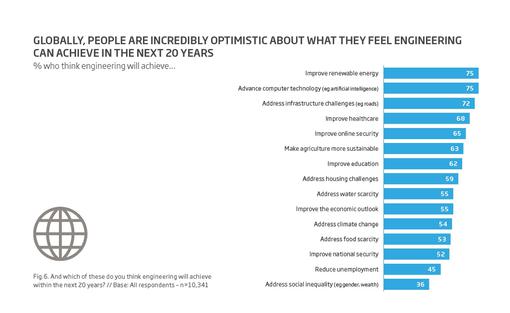Engineering: the key to solving the world's problems

Categories: QEPrize
QEPrize judges Paul Westbury, Viola Vogel and Frances Arnold in conversation at the recent QEPrize presentation
On Monday 26th October, we released a report on perceptions of engineering across the world. Here are some key points from Chapter 1: Solving the world's problems.
All over the world, people believe engineering holds the key to human progress. Yet, while recognising the sector’s role in powering innovation and creating today’s technology-based society, people also want the sector to do more when it comes to solving the planet’s most pressing problems.
People feel that engineering could and should lead the way in building a better, more sustainable world of tomorrow in areas including renewable energy, transport infrastructure, healthcare, reducing social inequality, and data security. The good news is that they believe it can be done. Professor Choon Fong Shih, of the National University of Singapore, notes
“One of the most encouraging findings of the QEPrize Create the Future Report is its highlighting of the faith the general public place in engineers and engineering to deliver changes which will be of great benefit to society. As engineers we must all be mindful of this responsibility[...] People are looking to engineering to solve the world’s problems.”
People are united in their respect for the engineering sector’s positive influence on society in the past. More importantly, nine in ten of them believe it can now provide solutions to the environmental, social and infrastructure challenges of the future.

While the current role of engineering is seen as inspiring new innovations, people are calling for a drastic shift in focus, with “solving the world’s problems” moving from 7th place in roles for engineering in the present to 1st place for roles for engineering in the future.
There is faith in engineering to solve the world’s problems. There is particular faith in engineering in solving environmental and infrastructure challenges. Professor Juergen Maier, Chief Executive of Siemens Plc writes, “I passionately believe that engineering holds the key to a better tomorrow. To see people’s faith in innovation and engineering as the future number one driver to solving the world’s problems is inspiring and also challenging.” Within the next 20 years, people want to see engineering improve energy and healthcare. BP CEO Bob Dudley highlights this critical need: “More energy is required to lift millions from poverty. Yet we need energy to have less environmental impact. Resolving that paradox is one of the great missions of this century.”Globally, people are incredibly optimistic about what they feel engineering can achieve in the next 20 years. 75% think that engineering will improve renewable energy and advance computer technology. More than half think engineering will improve issues ranging from infrastructure challenges to healthcare to making agriculture more sustainable to addressing climate change. Professor Frances Arnold at Caltech reminds us that
“sustainable energy technology is the basis of a sustainable society.”President of Stanford University Professor John Hennessy summarises this succinctly: “Engineers solve problems. They do so through the creation and deployment of new knowledge and technologies to create cost-effective solutions, often to the most demanding problems the world faces.”



